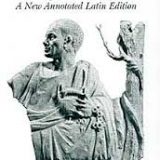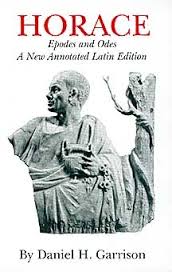The Complete Odes – Horace – 23 B.C.
Reviewed by: Michael Sympson Date: 26 December 2001
 He missed Stockholm by two millennia.
He missed Stockholm by two millennia.
“Poetry is but the metaphor of a mood” said a poet, who was one of the greatest of his own nation, but removed from Horace by 1,800 years. Horace himself, instead of creating such metaphors, preferred to give us the prosaic interpretation of his moods – with exceptions of course, testimonies to a rare and complex talent:
Odes, I:9
Vides ut alta stet niue candidum
Soracte nec iam sustineant onus
siluae laborantes geluque
flumina constiterint acuto?
Dissolue frigus ligna super foco
large reponens atque benignius
deprome quadrimum Sabina,
o Thaliarche, merum diota.
Permitte diuis cetera, qui simul
strauere uentos aequore feruido
deproeliantis, nec cupressi
nec ueteres agitantur orni.
Quid si futurum cras, fuge quaerere, et
quem fors dierum cumque dabit, lucro
adpone nec dulcis amores
sperne, puer, neque tu choreas,
donec uirenti canities abest
morosa. Nunc et Campus et areae
lenesque sub noctem susurri
composita repetantur hora,
nunc et latentis proditor intumo
gratus puellae risus ab angulo
pignusque dereptum lacertis
aut digito male pertinaci.
~
You see how, white with snows to the north of us,
Soracte looms; how snow’s over everything;
the burdened pines no longer buoyant,
streams at a stand in the winter weather.
So, rout the cold! Load logs on the andirons
as good hosts should do. Logs! And no rationing
your wine, young fellow there! Your sabine,
hustle it out from the crusty wine jars.
Then let the heavens see the rest of it.
When once they’ve lulled the winds at their weltering
ion whitened surf, no cypress quivers,
never a breath in the ancient alder.
What comes tomorrow, never you mind about.
Each day on waking reckon, Another!” and
chalk up your one more gain. Don’t spurn the
pleasure of love in your time for dancing,
while youth’s in bloom, while moody decrepitude’s
remote. Now haunt the malls and the stadium.
When little whispers stir in starlight,
make very sure you arrange to be there,
where — who’s in hiding? — giveaway laughter from
the dark, a girl’s laugh, muffled… lovely…
her bracelet tussled for in fun, or
ring from a teasingly tightened finger.
tr. John Frederick Nims
Odes, I:5
Quis multa gracilis te puer in rosa
perfusus liquidis urget odoribus
grato, Pyrrha, sub antro?
cui flauam religas comam,
simplex munditiis? Heu quotiens fidem
mutatosque deos flebit et aspera
nigra aequora uentis
emirabitur insolens,
qui nunc te fruitur credulus aurea,
qui semper uacuam, semper amabilem
sperat, nescius aurae
fallacis. Miseri, quibus
intemptata nites. Me tabula sacer
uotiua paries indicat uuida
suspendisse potenti
uestimenta maris deo.
~
What slender Youth bedew’d with liquid odours
Courts thee on Roses in some pleasant Cave,
“Pyrrha” for whom bind’st thou
In wreaths thy golden Hair,
Plain in thy neatness; O how oft shall he
On Faith and changed Gods complain: and Seas
Rough with black winds and storms
Unwonted shall admire:
Who now enjoys thee credulous, all Gold,
Who always vacant, always amiable
Hopes thee; of flattering gales
Unmindfull. Hapless they
To whom thou untry’d seem’st fair. Me in my vow’d
Picture the sacred wall declares t’ have hung
My dank and dropping weeds
To the stern God of Sea.
tr. John Milton[!!] (*1608 1674)
Ode IV:7
Diffugere niues, redeunt iam gramina campis
arboribus comae;
mutat terra uices et decrescentia ripas
flumina praetereunt;
Gratia cum Nymphis geminisque sororibus audet
ducere nuda chorus.
Inmortalia ne speres, monet annus et almum
quae rapit hora diem.
Frigora mitescunt Zephyris, uer proterit aestas,
interitura simul
pomifer autumnus fruges effuderit, et mox
bruma recurrit iners.
Damna tamen celeres reparant caelestia lunae:
non ubi decidimus
quo pater Aeneas, quo diues Tullus et Ancus,
puluis et umbra sumus.
Quis scit an adiciant hodiernae crastina summae
tempora di superi?
Cuncta manus auidas fugient heredis, amico
quae dederis animo.
Cum semel occideris et de te splendida Minos
fecerit arbitria,
non, Torquate, genus, non te facundia, non te
restituet pietas;
infernis neque enim tenebris Diana pudicum
liberat Hippolytum,
nec Lethaea ualet Theseus abrumpere caro
uincula Pirithoo.
~
The snows are fled away, leaves on the shaws
And grasses in the mead renew their birth
The river to the river-bed withdraws,
And altered is the fashion of the earth.
The Nymphs and Graces three put off their fear
And unapparelled in the woodland play
The swift hour and the brief prime of the year
Say to the soul, “Thou wast not born for aye.”
Thaw follows frost; hard on the heel of spring
Treads summer sure to die, for hard on hers
Comes autumn, with his apples scattering;
Then back to wintertide, when nothing stirs.
But oh, whate’er the sky-led seasons mar,
Moon upon moon rebuilds it with her beams;
Come “we” where Tullus and where Ancus are,
And good Aeneas, we are dust and dreams.
Torquatus, if the gods in heaven shall add
The morrow to the day, what tongue has told?
Feast then thy heart, for what thy heart has had
The fingers of no heir will ever hold.
When thou descendest once the shades among,
The stern assize and equal judgement o’er,
Not thy long lineage nor thy golden tongue,
No, nor thy righteousness, shall friend thee more.
Night holds Hippolytus the pure of stain,
Diana steads him nothing, he must stay;
And Theseus leaves Pirithšus in the chain
The love of comrades cannot take away.
tr. A.E.Housman (1859-1936)
Well, maybe I am a bit harsh on the old master. After all, it is said, that even the greatest genius rarely produces more than only six poems of outstanding quality in an entire lifetime – and these examples make already 50% of the required quota. However it can be quite a chore to slog through the pieces in between, in his “Carmina.” Horace definitely was a poet for the mature reader – which is perfectly fine, I wouldn’t have it any other way – but he also was sort of a schoolmaster for all his life. A very gifted and linguistically cultured schoolmaster; Friedrich Nietzsche – himself no mean latinist – praised Horace’s poetry for “the power radiating from every word into every direction.”
I came rather late to Latin; neither born nor bred to become a latinist, I picked up on the language initially only as a necessary tool for Roman history and law. It took me a while to appreciate the good stuff that came my way after the initial pains. Virgil is magical and often simply perfect – but I shall never know why Petronius extended his praise on Horace for his “felicitous care.” But please, don’t miscue my intentions here: I am encouraging to read Horace! By all means, discover for yourselves his poise and gentle wit, enjoy the urban conversationalist. Horace was a born essayist, but as a poet he doesn’t match expectations – at least not mine.
Over the ages Horace has become one of the most read, most imitated, most estimated, most translated, most venerated poets of all times. Is it possible, that all these discerning minds and the admiration by two millennia could have gotten it so wrong and only I know better? It can’t be. I must be missing something here. Even an air-head like Casanova is on record for having learned by rote Virgil’s “Aeneid,” Ariost’s “Orlando Furioso,” and the complete poetry of Horace. Casanova never ran out of pickup lines. So it seems, before I find the time and inclination to examine the situation more carefully, I will have to suspend judgement.
For the meantime I shall keep him in an airtight preservation jar for overrated icons. Why? Well for starters, Horace is a typical case for a politically almost risque poet under an oppressive regime, who in our time might have earned headlines as a somewhat veiled dissident. The Roman opposition in the 4th century had thought so too, and thanks to their efforts to preserve and pass on the best traditions of a disintegrating culture under siege, Horace came down to us almost intact. The ancient scholars and their senatorial patrons had been on a mission. It made Horace the emissary of Latin culture and the educator for cultured people in all ages.
The clouts of his reputation have stuck to his name for good, but it says little about his qualities as writer and poet. In our time he would have made the grades for Stockholm – and probably, like so many, for all the wrong reasons. If you ask me: a praised and praiseworthy author, but not really a great poet.















